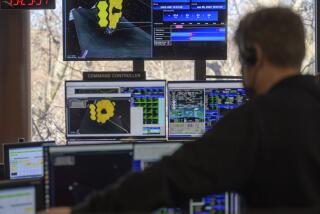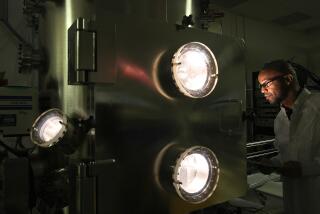Northrop Retools Company With Defense in Mind
- Share via
Northrop Grumman Corp. agreed Monday to sell its commercial aerostructures division, which makes fuselages and other parts mostly for Boeing Co. jets, to privately held Carlyle Group for $843 million in cash and securities.
The deal wasn’t a surprise, because Northrop Grumman had said in April it was in talks to shed the struggling operation, and Carlyle, which has ownership stakes in several aerospace and defense companies, reportedly was one of the suitors.
Separately, Northrop Grumman agreed to buy Comptek Research Inc., a small maker of electronic warfare simulators, for about $160 million of Northrop Grumman stock. Comptek, with annual revenue of $145 million, is based in Buffalo, N.Y.
Northrop Grumman’s aerostructures unit accounted for $1.4 billion of the company’s overall 1999 revenue of $9 billion, but the division has struggled to grow significantly in recent years. Among other things, the business was hurt by the Asian economic slump, which delayed aircraft orders from that region’s carriers, and by production snags at Boeing in 1999.
Meanwhile, Century City-based Northrop wants to focus on its defense lines, which include electronic warfare gear, information systems, radar systems and sensors. The company also is winding up production of the B-2 stealth bomber, which it builds in Palmdale. It also builds a big portion of the F/A-18 fighter jet in El Segundo, where it has about 2,500 workers.
Its aerostructures business, which makes fuselages for Boeing’s 747 jumbo jets along with parts for other aircraft--including military planes such as the C-17 transport and executive jets such as the Gulfstream V--has a plant in Hawthorne that employs about 1,000 people. No “significant” job cuts are expected following the sale, which is expected to occur in about a month, Northrop Grumman and Carlyle said.
The Hawthorne plant has long been the subject of speculation that Northrop would close it. But the company had continued investing in modern equipment for the plant.
“We continue to redefine Northrop Grumman for the future and are pursuing a strategic model that focuses on our high-end growth business areas of defense electronics, information technology and systems integration,” Chief Executive Kent Kresa said in a statement.
Northrop Grumman’s shift toward becoming a more streamlined, defense-oriented business has been a big hit on Wall Street, and the company’s stock has soared more than 70% since early March. However, the stock fell $4.25 a share, to $75.38, on Monday in composite trading on the New York Stock Exchange.
Even so, the aerostructures sale “is definitely a positive,” said Greg Tuorto, a money manager at Tocqueville Asset Management in New York, which owns about 200,000 Northrop Grumman shares. “I like the price and think that you might see further electronic acquisitions with the proceeds.”
For Carlyle, meanwhile, the deal would further elevate the Washington-based company into the middle ranks of the nation’s major aerospace contractors. Carlyle, founded in 1987, is headed by former Defense Secretary Frank Carlucci, and its senior counselor is James Baker III, the former secretary of state.
Carlyle’s portfolio of aerospace and defense companies already has combined annual revenue exceeding $4 billion, and this deal would lift that sum above $5 billion. The company’s holdings include not only its own aerostructures division, but also United Defense, which makes tanks and other armored vehicles, and Lear Siegler Services Inc., which provides aircraft and vehicle maintenance and other services for the military.
Under the Northrop Grumman deal, Carlyle--which has interests in several other industries, including real estate, telecommunications and health care--also would assume more than $400 million of the company’s post-employment retirement liabilities. Northrop Grumman, meanwhile, said it expects its revenue to total $7.6 billion in 2000 and $8.4 billion the next year.
*
Bloomberg News was used in compiling this report.
More to Read
Inside the business of entertainment
The Wide Shot brings you news, analysis and insights on everything from streaming wars to production — and what it all means for the future.
You may occasionally receive promotional content from the Los Angeles Times.











